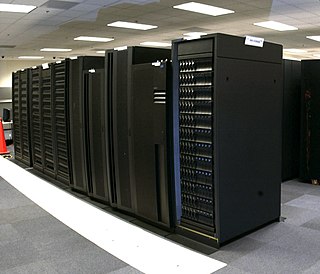
A hard disk drive (HDD), hard disk, hard drive, or fixed disk, is an electro-mechanical data storage device that stores and retrieves digital data using magnetic storage with one or more rigid rapidly rotating platters coated with magnetic material. The platters are paired with magnetic heads, usually arranged on a moving actuator arm, which read and write data to the platter surfaces. Data is accessed in a random-access manner, meaning that individual blocks of data can be stored and retrieved in any order. HDDs are a type of non-volatile storage, retaining stored data when powered off. Modern HDDs are typically in the form of a small rectangular box.
RAID is a data storage virtualization technology that combines multiple physical disk drive components into one or more logical units for the purposes of data redundancy, performance improvement, or both. This is in contrast to the previous concept of highly reliable mainframe disk drives referred to as "single large expensive disk" (SLED).

Western Digital Corporation is an American computer drive manufacturer and data storage company, headquartered in San Jose, California. It designs, manufactures and sells data technology products, including data storage devices, data center systems and cloud storage services.
Quantum Corporation is a data storage, management, and protection company that provides technology to store, manage, archive, and protect video and unstructured data throughout the data lifecycle. Their products are used by enterprises, media and entertainment companies, government agencies, big data companies, and life science organizations. Quantum is headquartered in San Jose, California and has offices around the world, supporting customers globally in addition to working with a network of distributors, VARs, DMRs, OEMs and other suppliers.

Iomega was a company that produced external, portable, and networked data storage products. Established in the 1980s in Roy, Utah, United States, Iomega sold more than 410 million digital storage drives and disks, including the Zip drive floppy disk system. Formerly a public company, it was acquired by EMC Corporation in 2008, and then by Lenovo, which rebranded the product line as LenovoEMC, until discontinuation in 2018.
NetApp, Inc. is an intelligent data infrastructure company that provides unified data storage, integrated data services, and cloud operations (CloudOps) solutions to enterprise customers. The company is based in San Jose, California. It has ranked in the Fortune 500 from 2012 to 2021. Founded in 1992 with an initial public offering in 1995, NetApp offers cloud data services for management of applications and data both online and physically.

Data corruption refers to errors in computer data that occur during writing, reading, storage, transmission, or processing, which introduce unintended changes to the original data. Computer, transmission, and storage systems use a number of measures to provide end-to-end data integrity, or lack of errors.
A virtual tape library (VTL) is a data storage virtualization technology used typically for backup and recovery purposes. A VTL presents a storage component as tape libraries or tape drives for use with existing backup software.

HGST, Inc. was a manufacturer of hard disk drives, solid-state drives, and external storage products and services.
Gluster Inc. was a software company that provided an open source platform for scale-out public and private cloud storage. The company was privately funded and headquartered in Sunnyvale, California, with an engineering center in Bangalore, India. Gluster was funded by Nexus Venture Partners and Index Ventures. Gluster was acquired by Red Hat on October 7, 2011.

The IBM Storage product portfolio includes disk, flash, tape, NAS storage products, storage software and services. IBM's approach is to focus on data management.
Although all RAID implementations differ from the specification to some extent, some companies and open-source projects have developed non-standard RAID implementations that differ substantially from the standard. Additionally, there are non-RAID drive architectures, providing configurations of multiple hard drives not referred to by RAID acronyms.

Dell EMC Isilon is a scale out network-attached storage platform offered by Dell EMC for high-volume storage, backup and archiving of unstructured data. It provides a cluster-based storage array based on industry standard hardware, and is scalable to 50 petabytes in a single filesystem using its FreeBSD-derived OneFS file system.
A clustered file system (CFS) is a file system which is shared by being simultaneously mounted on multiple servers. There are several approaches to clustering, most of which do not employ a clustered file system. Clustered file systems can provide features like location-independent addressing and redundancy which improve reliability or reduce the complexity of the other parts of the cluster. Parallel file systems are a type of clustered file system that spread data across multiple storage nodes, usually for redundancy or performance.
Panasas is a data storage company that creates network-attached storage for technical computing environments.

SanDisk Professional is a brand of Western Digital that produces external storage products designed and marketed for the Macintosh, creative pro, photography and A/V markets. Its USB, FireWire, eSATA, SAS, SCSI Thunderbolt, and Fibre Channel systems support all levels of audio/video production.
Schooner Information Technology, Inc. provided database management system appliances for Web 2.0, cloud computing and data centers. It was headquartered in Sunnyvale, California, and acquired by SanDisk in 2012.

StorSimple was a privately held company based in Santa Clara, California, marketing cloud storage.
Exalogic is a computer appliance made by Oracle Corporation, commercially available since 2010. It is a cluster of x86-64-servers running Oracle Linux or Solaris preinstalled.
A distributed file system for cloud is a file system that allows many clients to have access to data and supports operations on that data. Each data file may be partitioned into several parts called chunks. Each chunk may be stored on different remote machines, facilitating the parallel execution of applications. Typically, data is stored in files in a hierarchical tree, where the nodes represent directories. There are several ways to share files in a distributed architecture: each solution must be suitable for a certain type of application, depending on how complex the application is. Meanwhile, the security of the system must be ensured. Confidentiality, availability and integrity are the main keys for a secure system.









